Skip to comments.
It's Claimed that Only 1.6% of US Citizens Owned Slaves In 1860. We Ran the Numbers
Snopes ^
| April 4, 2024
| Alex Kasprak
Posted on 04/05/2024 4:36:06 AM PDT by where's_the_Outrage?
On April 2, 2024, the claim that "only 1.6% of US citizens owned slaves in 1860" went viral on X (formerly Twitter):
Though the 3.3 million people who viewed this statement (at the time of this reporting) may not be aware, this claim is part of an long-standing genre of online memes that use a misleading statistic to minimize the importance of slavery to antebellum America.
The actual percentage reported in these memes varies, Snopes has observed, from 1.3 percent to the present 1.6 percent. As Snopes reported in August 2019, the statistic to which these memes refer is most accurately conveyed as 1.4 percent.......
The year 1860 was a census year. Officials collected detailed information on slave ownership and distribution in the Southern states, and this data, while far from perfect, is likely the most reliable source of information for the state of slavery directly preceding the Civil War......
Adam Rothman, a historian at Georgetown University and an expert in the history of slavery who spoke to us via email, told us that the percentage of slaveholding families is "the better measure of the extent of slaveholding." One reason this is true, according to historian Adam Goodheart in an interview with Politifact in August 2017, is that a person could be (and often was) a "slave master" but not technically a "slave owner":
"Many non-slaveholding whites in the South rented slaves from wealthier slaveholders ... so it was very common for a white Southerner to be a 'slave master' but not technically a 'slave owner.'"
(Excerpt) Read more at msn.com ...
TOPICS: Chit/Chat; Conspiracy; Society
KEYWORDS: slaveowners; slaves; snopes
Navigation: use the links below to view more comments.
first previous 1-20 ... 121-140, 141-160, 161-180, 181-185 last
To: DiogenesLamp; x; Bull Snipe; HandyDandy
DiogenesLamp:
"Right back at you.
You and others keep trying to make the Declaration of Independence about slavery because you want to completely distract people from the fact it is about *INDEPENDENCE*."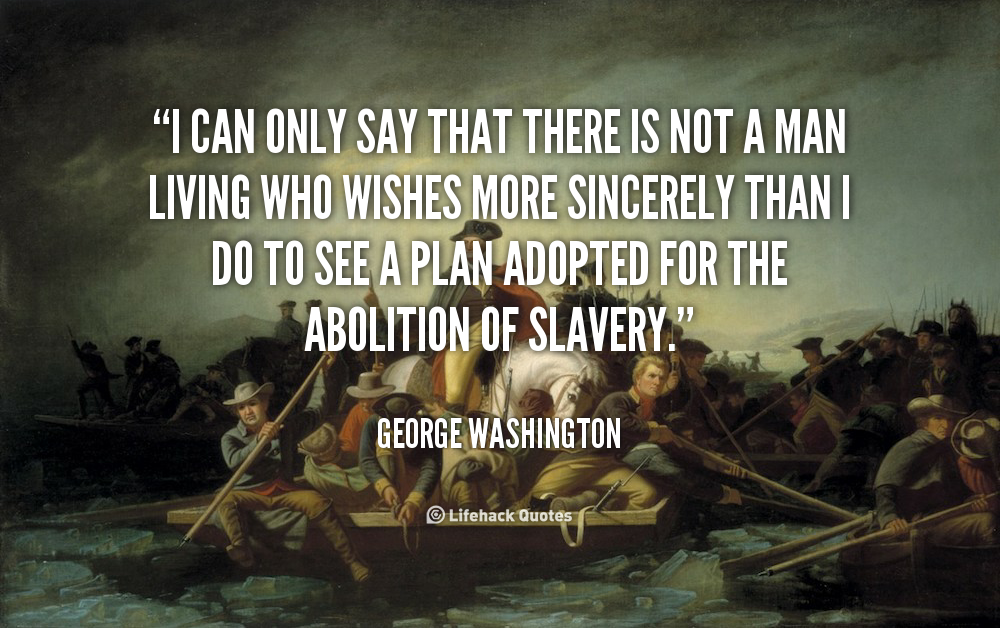 Naw... that's nonsense, because the logic of Independence is simple -- we're equal to you, with God-given rights, which you've abused in horrible ways, so we are declaring independence.
Naw... that's nonsense, because the logic of Independence is simple -- we're equal to you, with God-given rights, which you've abused in horrible ways, so we are declaring independence.
Equality is the foundation on which the entire logic of independence is built.
To put that another way, if we were lesser beings equivalent to, say, livestock, then we must suffer whatever demands our superiors place on us.
But we're not, we're equal, and therefore can only be governed through our consent, the consent of the governed.
That's why equality is the foundation on which independence is built, and it's why nearly every Founder opposed slavery, at least in principle and in the long-term.
DiogenesLamp: "Why do you do this?
Because it contradicts your claimed belief that the South had no right to leave.
The very founding document of this nation says they absolutely had a right to leave, so you want to try to say the Declaration of Independence was about slavery."
Nooooo... our Declaration of Independence clearly and unequivocally spells out our "right to leave" as being conditional, based on the "parade of horribles" it lists: 
"...whenever any Form of Government becomes destructive of these ends, it is the Right of the People to alter or to abolish it, and to institute new Government, laying its foundation on such principles and organizing its powers in such form, as to them shall seem most likely to effect their Safety and Happiness.Prudence, indeed, will dictate that Governments long established should not be changed for light and transient causes; and accordingly all experience hath shewn, that mankind are more disposed to suffer, while evils are sufferable, than to right themselves by abolishing the forms to which they are accustomed.
But when a long train of abuses and usurpations, pursuing invariably the same Object evinces a design to reduce them under absolute Despotism, it is their right, it is their duty, to throw off such Government..."
The history of the present King of Great Britain is a history of repeated injuries and usurpations, all having in direct object the establishment of an absolute Tyranny over these States.
To prove this, let Facts be submitted to a candid world...
...They too have been deaf to the voice of justice and of consanguinity.
We must, therefore, acquiesce in the necessity, which denounces our Separation, and hold them, as we hold the rest of mankind, Enemies in War, in Peace Friends...
In the simplest possible terms, the Declaration says to the King --
"you're not better than us, so we don't have to put up with your cr*p, so go to hell!" So independence begins in equals suffering abuses, and the efforts of our Lost Causers to deny the importance of equality is more than a little grating on anyone who understands even a little about the subject.
DiogenesLamp: "It wasn't.
If you were honest you would admit that and just accept the fact that your side is legally and morally wrong about trying to stop people from having independence."
Sorry, but there's nothing honest in your attempts to compare the conditions of 1860 with those of 1776 -- they weren't even remotely comparable.
And there's nothing honest in your claims that the Declaration creates and unlimited "right of secession", because it does nothing of the sort.
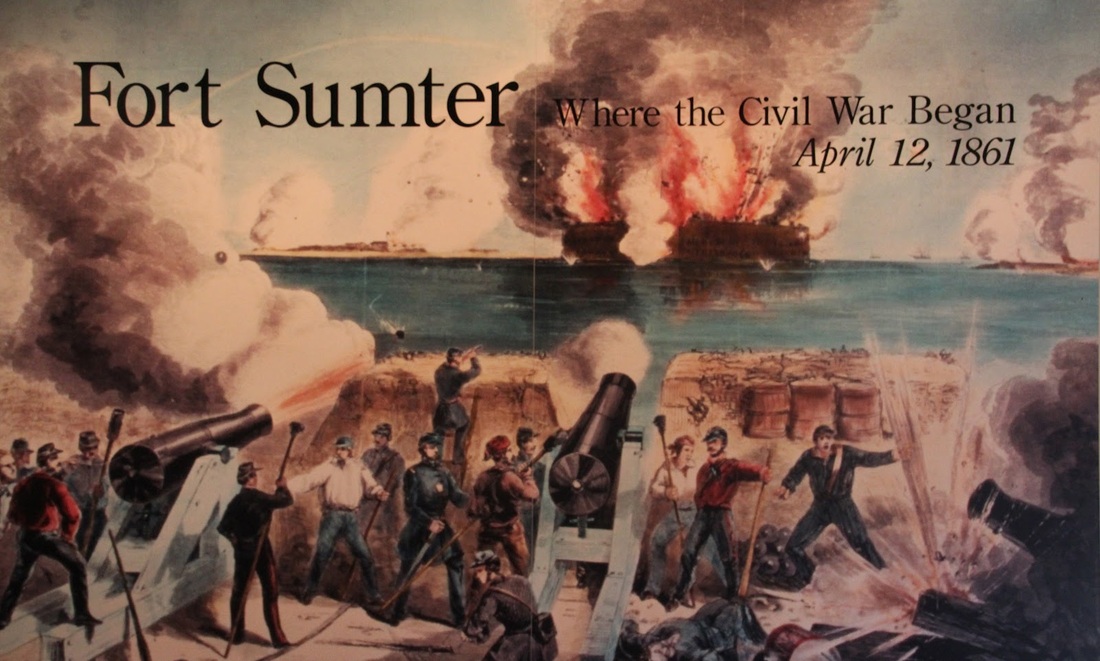 Instead, the Declaration lays out dozens of conditions which justify independence, and not even one of those conditions existed in 1860.
Instead, the Declaration lays out dozens of conditions which justify independence, and not even one of those conditions existed in 1860.
All this is clearly spelled out by the Father of the Constitution, James Madison, in his proscription against secession "at pleasure", and that fully explains why in 1861, the Virginia delegation refused to declare secession for "light and transient causes", but instead waited until after war began at Fort Sumter to declare secession and war against the United States.
DiogenesLamp: "The Declaration of Independence is a *KNOCKOUT PUNCH* to your side, and this is why you keep trying to divert any discussion of it into "slavery."
It's dishonest, and your side needs to quit doing it."
Of course, you are simply referring to your own weak arguments here, and such diversions are all coming from your own side, as a review of this thread clearly shows.
DiogenesLamp's post #133 is the first time on this thread the Declaration of Independence is mentioned in this context.
![]()
181
posted on
04/11/2024 4:47:54 AM PDT
by
BroJoeK
(future DDG 134 -- we remember)
To: DiogenesLamp; x; Bull Snipe; HandyDandy
DiogenesLamp:
"Tired of your magic show." Ha! Well... "magic" is your effort to turn cotton's 50% of total US exports into 72% of Federal tariff revenues.
New York harbor, circa 1860,
where 74% of Federal import tariff revenues were collected:
 It's not 72%, at most you can argue for slightly over 50%, but the real number is circa 30% because that is the maximum net-net-net after subtracting out "imports" from the North (plus "exports" to the North), meaning that physically, roughly 30% of all imports went to Southerners (including Border State Southerners).
It's not 72%, at most you can argue for slightly over 50%, but the real number is circa 30% because that is the maximum net-net-net after subtracting out "imports" from the North (plus "exports" to the North), meaning that physically, roughly 30% of all imports went to Southerners (including Border State Southerners).
In 1860, Southerners (including Border States) represented roughly 30% of the US white population and produced about 30% of US GDP, and therefore, logically, consumed around 30% of US imports, meaning they paid roughly 30% of the Federal tariff revenues.
In the years before 1860 Federal construction spending, especially coastal forts, was focused more than 50% in the South.
See my posts #153 and #173 above for more details.
New Orleans harbor circa 1860 --
where 5% of Federal import tariff revenues were collected.
Over half of US cotton exports shipped directly from New Orleans to European customers.
Other New Orleans exports were produced throughout the South & Midwest -- sugar, tobacco, beef, pork, lard, buffalo robes, bear hides, deerskins, lumber, lime, flour, and corn:
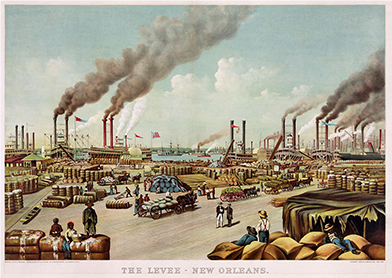
182
posted on
04/11/2024 6:00:56 AM PDT
by
BroJoeK
(future DDG 134 -- we remember)
To: BroJoeK
Naw... that's nonsense, because the logic of Independence is simple -- we're equal to you, with God-given rights, which you've abused in horrible ways, so we are declaring independence. Somehow this logic escaped the founders because they continued having slaves for "four score and seven years" after they signed the Declaration of *INDEPENDENCE*.
Wasn't about slavery. Wasn't intended to be about slavery. History revisionists have made it about slavery.
Was about *INDEPENDENCE* and how states had a right to it. That is all it was about.
Looked up the Magna Carta. The word "equals" is used in there eight times. Is it about slavery? Are they speaking of the slaves?
Can you be honest?
183
posted on
04/11/2024 3:38:22 PM PDT
by
DiogenesLamp
("of parents owing allegiance to no other sovereignty.")
To: DiogenesLamp
DiogenesLamp:
"Somehow this logic escaped the founders because they continued having slaves for "four score and seven years" after they signed the Declaration of *INDEPENDENCE*." Sorry, I don't "get" why you even want to debate this point.
The Declaration of Independence declares that "all men are created equal..." etc., and somehow you want to tell us those words don't count, only the word "independence" means anything?
Why?
The logic of the Declaration seems perfectly simple and obvious to me, as does the fact that, to a man, every Founder professed his opposition to slavery, at least in principle and in the long term.
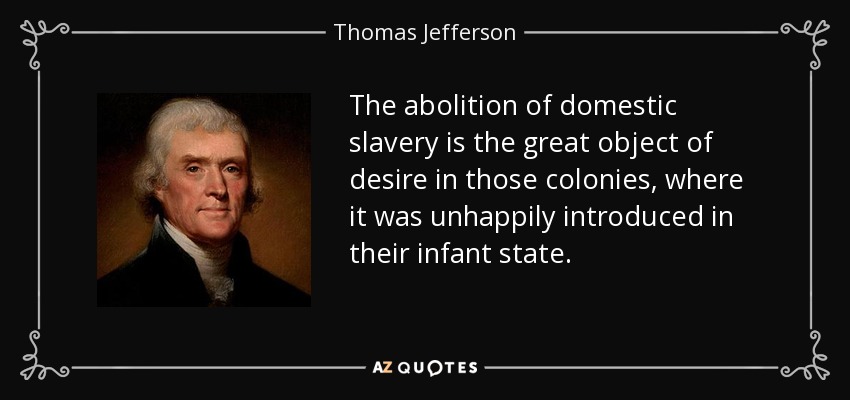 Do I need to prove that point to you?
Do I need to prove that point to you?
I've got a long list of quotes from every Founder, expressing their opposition to slavery.
And we know that some took actions against slavery rather quickly.
So, sure, they weren't perfect angels, but all of them thought slavery was wrong and should be abolished gradually, lawfully, peacefully.
DiogenesLamp: "Wasn't about slavery.
Wasn't intended to be about slavery.
History revisionists have made it about slavery.
Was about *INDEPENDENCE* and how states had a right to it. That is all it was about."
But you are the one who keeps picking at this scab, you brought it up, everyone here is simply responding to your claims.
For some inexplicable reason you wish to minimize the importance of "all men are created equal", and we're simply reminding you, that's not the case.
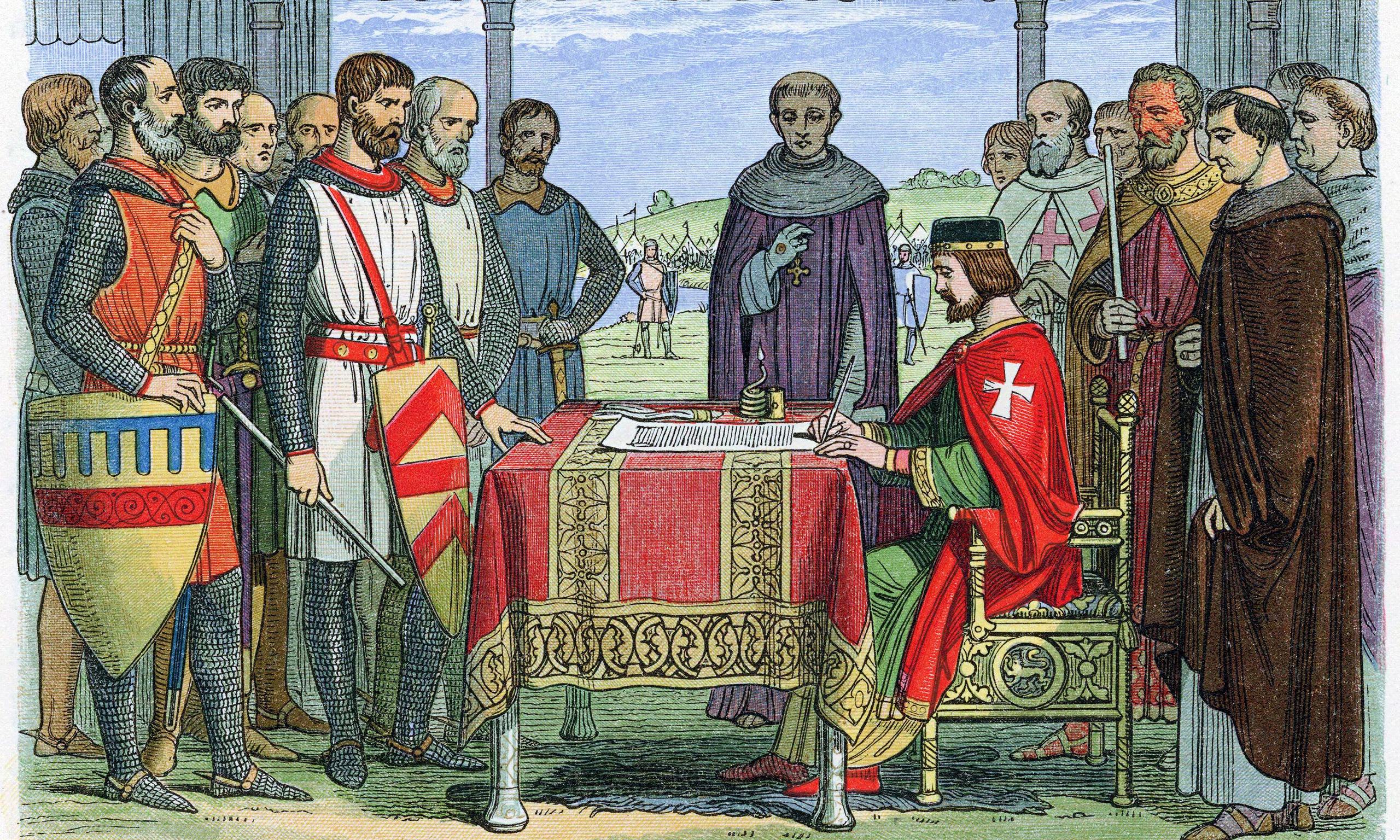 DiogenesLamp: "Looked up the Magna Carta.
DiogenesLamp: "Looked up the Magna Carta.
The word "equals" is used in there eight times.
Is it about slavery?
Are they speaking of the slaves?
Can you be honest?"
Magna Carta? From 1215? 561 years before 1776?
Are we not talking about an entirely different time and circumstances?
The contexts were entirely different, however, like our Founders after 1776, by 1215, the English had already begun to restrict slavery and ban imports of new slaves.
"Let no one dare hereafter to engage in the infamous business, prevalent in England, of selling men like animals."[15][16]
The Council of London, 1102
The Magna Carta itself includes universal sounding language, including:
"No free man shall be seized, imprisoned, dispossessed, outlawed, exiled or ruined in any way, nor in any way proceeded against, except by the lawful judgement of his peers and the law of the land"
So, it wasn't only about the king and his peers of the realm.
184
posted on
04/12/2024 4:00:57 AM PDT
by
BroJoeK
(future DDG 134 -- we remember)
To: BroJoeK
The Declaration of Independence declares that "all men are created equal..." According to many of you, that is *ALL* it says. You've brainwashed yourselves into thinking those are the only five words contained in the document.
"No free man shall be seized, imprisoned, dispossessed, outlawed, exiled or ruined in any way, nor in any way proceeded against, except by the lawful judgement of his peers and the law of the land"
Specifically excluding un-free men. In other words, "slaves."
Yes, they had slaves in England up till the 1700s, and of course English slave traders made quite a lot of profit in the business up to and beyond that era.
185
posted on
04/12/2024 8:16:27 AM PDT
by
DiogenesLamp
("of parents owing allegiance to no other sovereignty.")
Navigation: use the links below to view more comments.
first previous 1-20 ... 121-140, 141-160, 161-180, 181-185 last
Disclaimer:
Opinions posted on Free Republic are those of the individual
posters and do not necessarily represent the opinion of Free Republic or its
management. All materials posted herein are protected by copyright law and the
exemption for fair use of copyrighted works.
FreeRepublic.com is powered by software copyright 2000-2008 John Robinson
 Naw... that's nonsense, because the logic of Independence is simple -- we're equal to you, with God-given rights, which you've abused in horrible ways, so we are declaring independence.
Naw... that's nonsense, because the logic of Independence is simple -- we're equal to you, with God-given rights, which you've abused in horrible ways, so we are declaring independence.
 Instead, the Declaration lays out dozens of conditions which justify independence, and not even one of those conditions existed in 1860.
Instead, the Declaration lays out dozens of conditions which justify independence, and not even one of those conditions existed in 1860.
 It's not 72%, at most you can argue for slightly over 50%, but the real number is circa 30% because that is the maximum net-net-net after subtracting out "imports" from the North (plus "exports" to the North), meaning that physically, roughly 30% of all imports went to Southerners (including Border State Southerners).
It's not 72%, at most you can argue for slightly over 50%, but the real number is circa 30% because that is the maximum net-net-net after subtracting out "imports" from the North (plus "exports" to the North), meaning that physically, roughly 30% of all imports went to Southerners (including Border State Southerners).
 Do I need to prove that point to you?
Do I need to prove that point to you? DiogenesLamp: "Looked up the Magna Carta.
DiogenesLamp: "Looked up the Magna Carta.